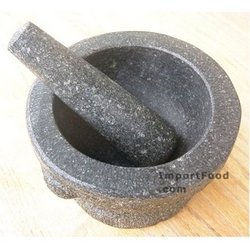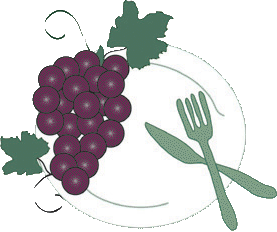
 Everybody's got a stereotype, and Italians are no different: wildly passionate one moment, indifferent the next. Political corruption? cynical indifference. Matters of the heart? Passionate but fickle. Matters of the table? Ah, passionate to the core.
Everybody's got a stereotype, and Italians are no different: wildly passionate one moment, indifferent the next. Political corruption? cynical indifference. Matters of the heart? Passionate but fickle. Matters of the table? Ah, passionate to the core.
My Italian restaurant friends get particularly incensed when American chefs misappropriate Italian culinary language and apply a name like "carpaccio" to a plate of sliced raw meat, or "pesto" to any old green sauce.
So let's be clear: the word "pesto" comes from the Latin and means "crushed." Not chopped to smithereens by a whirling blade. We're not trying to stand in the way of progress here, but running parsley through the Cuisinart produces an industrial sludge that you might as well call Milk of Magnesia or Castor Oil; pesto genovese it ain't.
The distinction may seem trivial or irrelevant, but not for a few True Believers, purists, conservators, Keepers of the Flame. In this particular case, Italian cooks from Italy. With theological intensity, they argue that if you call something pesto, it has to be pesto. Not some metaphorical version of pesto, but the real thing, what Italians of all regions understand to be the genuine, traditional Ligurian recipe for pesto: the small leaves of Genovese basil, crushed by hand in a pestle, with garlic and olive oil, just before serving. Pine nuts optional.
Unfortunately, there's no legal protection for pesto or carpaccio or amatriciana, the way there is, say, for Chianti Classico--made from San Giovese grapes grown in a specific zone between Florence and Siena. (Notwithstanding that California's Gallo winery actually won a trademark infringement action against a Chianti Classico consortium for using the traditional logo of a black rooster, the emblamatic gallo nero.) The Italians' point is, don't call a parsley-walnut sauce made in a blender "pesto."
All too often, Seattle dumbs it down. We compromise, we fudge, we dilute. In the end, we pretend it doesn't matter, we're left with a shiny surface. Looks like chicken, tastes like dogfood. Beware.
Posted by Ronald Holden at May 13, 2008 9:30 AM | TrackBack

The International Kitchen
Cooking school vacations in Italy, France & Spain.


 Who links to me?
Who links to me?
At first it seemed weird to me as well, calling all the other pesto-like sauces pesto. But then it was kind of pushed on me by food articles, food magazines, even blogs...and I got used to it.
I understand the strive to protect the authentic, but then again - it's a matter of understanding what the dish is about. If you say 'parsley sauce', it can mean almost anything, but if you say 'parsley pesto', people get it. It's like pesto, only that it's made with parsley.
I think its pointless to fight against all the 'mixed cuisine' that is bound to happen anyway when the word 'pesto', without any additions to it, still keeps its original meaning. Thank God for that, right?
Posted by: Evelin at May 18, 2008 4:52 AMI definitely see your point. In most cases, I would ardently agree, but I get the feeling that you are coming down on some more modern, "fusion" restaurants that come to heads with more traditional places. Am I wrong? I am a fan of both old school (Sorrentino) and new school (How to Cook a Wolf) and where I decide to eat depends on my mood at the moment. However, just because someone from the old school deems the new school foul doesn't mean it is.
In fact, it's a damn good pesto, regardless of whether it falls within the traditional confines.
Posted by: Jake at May 14, 2008 11:37 PMRight on! Having lived in and eaten my way through Italy I am amazed at what chefs in the USA name dishes that don't even come close to their Italian namesake. A friend fixed
bolito misto for my birthday. He had lived he
Italy for years and knew what it was all about.
Pure heaven!
Thanks for the memories,
Betty
Posted by: Betty Frost at May 13, 2008 12:50 PMI love pesto. For some great pesto recipes, check out: http://iheartpesto.blogspot.com
Posted by: anon at May 13, 2008 10:48 AMCouldn't agree more.
It often becomes SO easy to throw out a term like "pesto" as a way to provide familiarity or to quickly communicate some root concept of a product. As you indicate this usually means some sort of green sauce made from chopped leaves of some sort, and usually (but not always) with oil of some sort.
To say "walnut pesto" to almost anybody would, in just two simple words, quickly communicate almost (but not quite) the entire recipe. Although in the case you site in your blog, it really should hae been "parsley walnut pesto".
The unfortunate cost of such "slang" however is that it destroys the true meaning of the term "pesto".
An earlier form of this sort of "dumbing down" was when great french wines were first gaining a foothold in the US. One of the leading wines amongst most drinkers was "Chablis", so popular was it, that restaurants would run out of it (or perhaps not even be able to get any), but customers still clamoured for CHABLIS! So what did they do? Dumb it down, and serve almost any "white wine" as their chablis. The chablis being served got cheaper and cheaper, with the (then) poor quality California white wines becoming the defacto product being served. Soon, "chablis" became shorthand for "cheap white wine" often of questionable quality.
This of course virtually devistated the US market for "real" Chablis from France. To this day, wine drinkers will often dismiss Chablis as a worthy libation, instead perfering the far more sophisticated Chardonnay.
What they don't realize, is that Chablis IS Chardonnay... sigh...
So here's for protecting PESTO!
Posted by: Robert Hess at May 13, 2008 10:39 AM